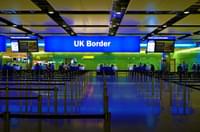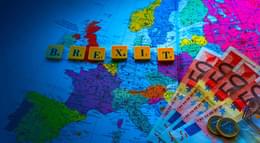
Britain’s immigration contradiction
If the Government is serious in its promise to tackle mass immigration then it needs a leader with the intellectual clarity and moral courage to cut through the decades-long political consensus and chart the route to meaningful change, says Bruce Newsome.
You would have thought that the British government would have a robust policy on immigration by now. The major party in government is the Conservative, which has for years promised to reduce immigration, even before it returned to government in 2010. Then the Brexit referendum in June 2016 confirmed what previous national elections had suggested: that concerns to control immigration are popular and rational – informed by stark facts, such as the fact that migrants were arriving so quickly that they would need a home to be built every 5 minutes for 25 years. Such stark facts shattered the Labour Party's long-standing spin that all opposition to immigration is racist.
By 2016, the opportunity was never riper for a Conservative government to change long-term policy. Yet David Cameron did not include any curbs on free movement when he promised, in spring 2016, to negotiate from the EU a better deal. Voters preferred Brexit, and he resigned, although this week he emerged from hiding to claim that even though he regrets Brexit he has no regrets over his handling of the EU or the referendum. That makes Cameron sound like his old sparring partner Tony Blair, who said the same of himself last week – and makes Cameron this week's barmy Brexit-basher of the week.
Cameron's successor had the opportunity to repudiate his mistakes, but Theresa May has not. In fact, she was complicit, having served as Home Secretary from 2010 to 2016, when she consistently promised to reduce immigration but consistently failed to deliver.
May lurches from one belated compromise to another. Only one example is the set of sordid migrant camps known as the "jungle" around Calais – the busiest port of departure to Britain. For decades, France has abrogated its responsibilities – under international law – to process its migrants as either refugees or deportees. Yet the British government has consistently debased international law in deference to free-movement lobbyists. On 18 January of this year, May personally signed an agreement to accept more of these migrants and to pay France to improve its border at Calais.
May's bilateral capitulation to France would make diplomatic sense if May had rejected EU jurisdiction over immigration, but she has not. The deal that May signed with the EU on 8 December 2017 promised to keep Britain's border with Ireland aligned with all EU principles (including the free movement of people). Thus, even if May had refused to accept France's migrants, they would displace to Ireland, which has the same self-interests as France to ease these migrants into Britain.
The same agreement guaranteed all rights of EU citizens, including free movement and residency, for an indefinite period – certainly beyond her fake separation date of March 2019. Indeed, May's explanatory letter to parliamentarians allowed for the European Court of Justice to retain some jurisdiction, at least consultatory, over the rights of EU citizens in Britain for a period of eight years – i.e., to the end of 2025 – and deferred a final settlement indefinitely.
May is responsible too for appointing her own successor as Home Secretary – the feckless Amber Rudd. We now know for sure that the Home Office is unready for a new immigration regime: during May's tenure as Home Secretary, the Home Office inequitably handled the first Commonwealth immigrants (the "Windrush generation", whose legislated rights date from 1948 to 1973), such as to crack down on some whose records of lawful immigration the Home Office itself had lost or destroyed. Rudd has only just admitted this mistake, without offering a policy that would navigate between the new realizations that British policy is too hard on lawful immigrants and too soft on illegal migrants.
One solution would be a national identity card, granted to those who prove rights to citizenship or residency. National identity cards would prevent most unlawful employment, welfare abuse, and health tourism, which are the main pull factors in migration, but Cameron and May preferred to acquiesce than challenge the mistaken consensus that national identity cards are inherent threats to privacy.
May has distracted from her own culpability by spinning a split with Rudd. Supposedly, Rudd is deferring legislation for post-EU immigration and refusing to commit to reducing annual net migration to below 100,000 by the general election in 2022. I find this split hard to believe – Rudd's policies are consistent with May's – indeed, somebody has leaked a memo from Rudd informing May of harsher deportations months ago. If May wanted Rudd to do anything different, she could order Rudd to do it, or replace Rudd, or keep making migration deals personally, as she has already done with France and the EU.
I am surprised that the news media have so gullibly accepted May's spin while piling on Rudd with vicious kicks and punches. Really, the news media should be more sceptical by now: May had already played this game of distraction in preceding weeks, when announcing a u-turn on stop-and-search, which she had banned when Home Secretary but now wants to counter an explosion in violent crime. Rudd and May are as useless and culpable as each other, but I don't understand why the pupil is getting more blame than the teacher.
Ironically, in this same week, May's government finally delivered to the EU its expectations for its post-Brexit relationship with the EU. Oliver Robbins, May's chief adviser on Europe, told the EU that Britain was prepared to negotiate a new immigration regime without a hard border at Northern Ireland, but the EU said the proposals are inconsistent with its long-standing expectations that Britain is either in the customs union, with all obligations to free movement, or not, which May's agreement of 8 December 2017 appeared to confirm.
So, we're back to square one, nearly two years since the referendum, less than a year from fake separation from the EU, in expectation of years of compliance with EU free movement, while the government maintains a contradictory promise to reduce immigration.
Yet, politically, we should not be surprised. We have the same person (Theresa May) leading our policy in 2018 as in 2010 – the arch political procrastinator, capitulator, and scrambler. Therefore, as I have said on these pages many times in the last six months, Britain's immigration contradiction is unlikely to be resolved before a new prime minister; and we won't have a new prime minister until the Conservative Party puts electable policies before unelectable incumbency. The Party will need someone – like Margaret Thatcher – with the intellectual clarity and moral courage to cut through the decades-long political consensus in order to articulate rational policies.









